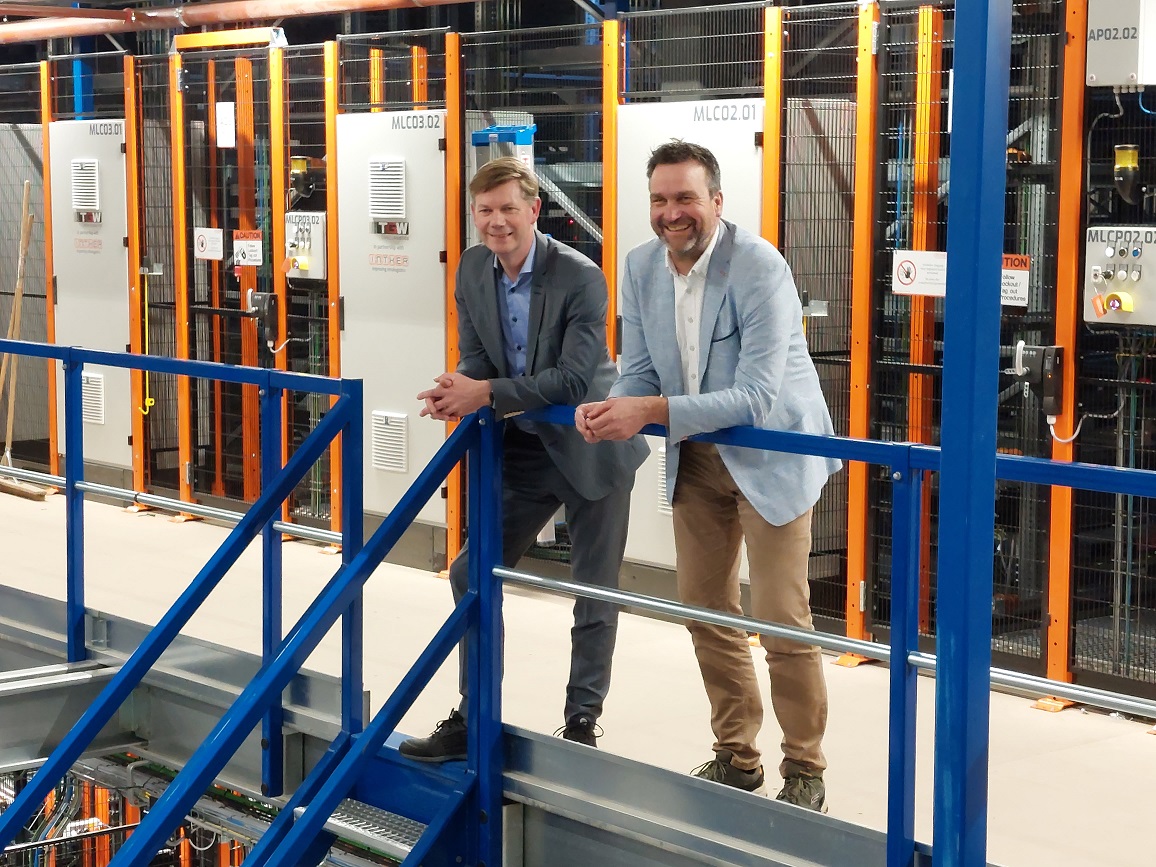25 August 2023
In 1998, Martijn Herder and Paul Hermsen decided to set up their own company under the name Inther. A quarter of a century later, they manage an internationally operating intralogistics system integrator that excels with resourceful concepts for complex warehouses. “The market is constantly changing. And so do we.”
The two founders of Inther still remember the kick they got when they lit a pick-to-light display for the first time with their own software. Or when they delivered their first integrated system at Audax, including conveyors, PLC controls and WCS software.
After 25 years, they still feel the same sensation when a customer such as Coolblue, Skechers, Blokker or Picnic starts using their intralogistics systems. And not only they. “The colleagues at Inther love to build something that actually moves. And what results in the customer being able to deliver a package,” says Martijn Herder.
Together with Paul Hermsen he is in the warehouse of Zeeman TextielSupers, where the finishing touches are being made to the next highlight in Inther's rich history. “When this system starts running, there will be a thunderous force over all those conveyors. Then we will all undoubtedly get that wow effect again,” says Hermsen.
Fine-meshed
Inther's history has more highlights. Such as the shuttle system with stacked totes from Marchon Eyewear, the first for which Inther supplied the controls itself. Or the self-developed GRIPP robot piece picker, which has been running successfully for almost a year at a major international cosmetics brand. “And look at what Hema is doing on that small piece of terrain in Utrecht. They handle the same volumes as other large warehouses, but with much less invested capital and fewer people,” says Herder, who receives support from Hermsen. “Hema runs a miniload and a shuttle system. They work with pick-to-light, put-to-wall and pick-to-cart. Spread over a period of twelve years, we have always added something new. Time and again we have analyzed the processes and data to determine which technology is the best fit. That is the area on which we distinguish ourselves. “
The need for such solutions is only growing. “Look at the logistics landscape in the late 1990s and now. The fine-meshed nature only continues to increase. Everything has to be smarter and faster,” says Herder. Hermsen: “In the past, a store received half a pallet of toasters, now one or two several times a week. This leads to much more handling in the warehouse, while there are only fewer people available for this. “
Robot piece picker
Inther is now more than just a system integrator. The company builds its own plug-and-play conveyors and has developed an A-Frame and document handling machines in-house.
“We grow by making the same consideration over and over again: what else can we do for our customers?” Herder explains. This results in innovations that actually add something to the market. An example is the already mentioned GRIPP: a robot piece picker based on a gantry robot instead of an articulated arm robot. It has a larger range, which makes it possible to process no less than twelve orders at the same time. “By linking the GRIPP to an automatic storage system, we are getting closer to our goal: designing warehouses that are so automated that we only need process operators,” explains Hermsen.
Half a word
In 25 years Inther has grown into a company with 300 people and offices in Moldova, China, Germany, Belgium, and the United States. “We invest a lot in the organization’s learning capacity. This is necessary because the market is constantly changing. So we have to change as well”, emphasizes Herder. Hermsen: “That is why we are now investing in data science. Our systems produce a wealth of data, which we can use even more.”
One thing has not changed in 25 years: the way in which Herder and Hermsen work together. As co-CEOs, they still share a room in the head office in Venray, where their desks are opposite each other. Half a word is enough for them, Herder and Hermsen laugh: “In other companies, management have brainstorm sessions for a day to think about the future together. We already sit together every day and discuss it all the time.”

Martijn Herder (l.) and Paul Hermsen (r.): “The fine-meshed nature has grown enormously and will only continue to increase.”
ZEEMAN: “FIRST THE PROBLEM, THEN THE SOLUTION”
In his search for a system integrator, Bernard Smedema of Zeeman noticed that there are two types: system integrators who think in terms of the means and system integrators who think in terms of solutions. Inther belongs to the latter category. “First, we together understood what the logistical challenge is, looking at the entire supply chain, and then looking at the resources that together form a total solution. This is one of the reasons why we connect so well with Inther,” says the logistics manager of the textile supermarket from Alphen aan den Rijn.
Zeeman and Inther also regularly paused during the project: what problem are we actually solving? Are we keeping the goal in mind? “The fact that we also dared to question the choices made later in the project definitely benefited the integrated solution,” says Smedema. “Of course, sometimes you run into issues, but they have always been resolved in a tidy manner. As a result, mutual trust has only grown.”
This is a translation of an interview, that originally appeared in edition 3-2023 of the magazine Warehouse Totaal.
Original text: Marcel te Lindert
Translation: Inther Group
